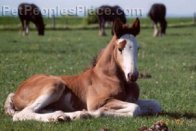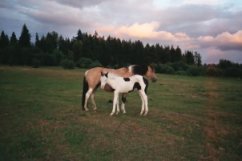The Proper Weaning of Foals

However, weaning is both natural and necessary. In the wild, a mares often become pregnant again so have to wean the foal to have available resources to supply the new life growing inside her. In a domestic situation, it’s up to us to take steps to start the weaning process.

Steps to be taken before weaning:
- The foal should be used to being with other horses. That’s how he learns about "being a horse” and what he is supposed to act like in a herd situation. This comes naturally to them when mothers are turned out in herds, but those who have been raised with just their mother may need some time in a herd before weaning starts.
- The foal should not be dependent on his mother for his complete nutritional needs. He should be eating grass, hay and grain before being weaned.
- The foal should be used to the paddock or stall where he will be weaned. Check thoroughly for dangers, such as loose boards, sticking out nails, wore and bailing twine. All potential dangers must be removed.
- Separate large, aggressive foals from smaller, more timid ones during weaning to reduce risk of injuries and give all better access to feed.
- Don’t leave halters on because they can get caught cause serious injury or death.
- Make racks a safe height for foals to eat from.
- Don’t forget that foals also need trace-mineralized salt and a clean, fresh supply of water.
- Don’t deworm foals for the first time at weaning. Deworm them at least a week before weaning or wait three weeks after weaning.
- Vaccinate foals three or four weeks before or after weaning.
- This is not the time to get his hooves trimmed, or teach him to lead or tie.
Foals are usually weaned at about four months old. Those that spend a lot of time exploring away from their mother and playing with other youngsters will have less trouble during weaning. Sometimes, in the case of orphaned foals, weaning has to happen earlier.
Weaning can be done in more that one way, depending on the what you have available.
- Remove the mare to another location, leaving the foal in his surroundings and with the other weanlings or an older "babysitter".
- Moved the mare out of sight and sound of the foal. This is stressful and causes a lots of running back and forth at the fence line and whinnying between mare and foal
- It isn’t a good ideato separate the mare and foal during the day and stall them together at night as some do, as thisstarts the stress over again each day.

It has been shown in studies that foals who suffer too much stress when being weaned can lose their appetites and lose weight… then when they recover have a growth spurt. This can cause developmental orthopedic disease (DOD), in which bones and joints begin to grow abnormally. Possible causes are:
- Contracted tendons
- Physitis
- Bone cysts in the joints
Foals which have little stress during weaning grow evenly with height and weight increasing in steady increments. This smoother growth pattern makes them less susceptible to DOD.
Other problems can occur when foals are weaned and under undue stress:
- Gastric ulcers
- Delayed reproductive function
- Strangles
- Influenza
- Equine herpes virus (aka rhinopneumonitis)
- Salmonella
- Increased levels of cortisol (a hormone secreted by the adrenal cortex) which can weaken the immune system.
- Poor sleep
- Become panicky increasing the chance of injury
Before you wean put together a plan. It will take her a few days to "’dry up" , so she will be sore and grouchy. Don’t milk her out since this encourages continued milk production. If she is in good condition physically you may try reducing her grain ration for a few days to help her out.
Weaning the Foal in Hot Weather
For those of us with foals born this spring, it is weaning time. This is a stressful situation for both mare and foal, not to mention the owner who has to listen to all the whinnying and look at those pitiful foal faces! Usually we wean at 5-6 months. But, the weather is so hot (100+ for days and days) here in Oklahoma that when we often have to wait. There is no reason to cause additional stress because of the weather when a couple months won’t make that much difference. If you are preparing to wean, please take into consideration the weather and other factors. It is easy to lose a foal due to stress in these circumstances.



